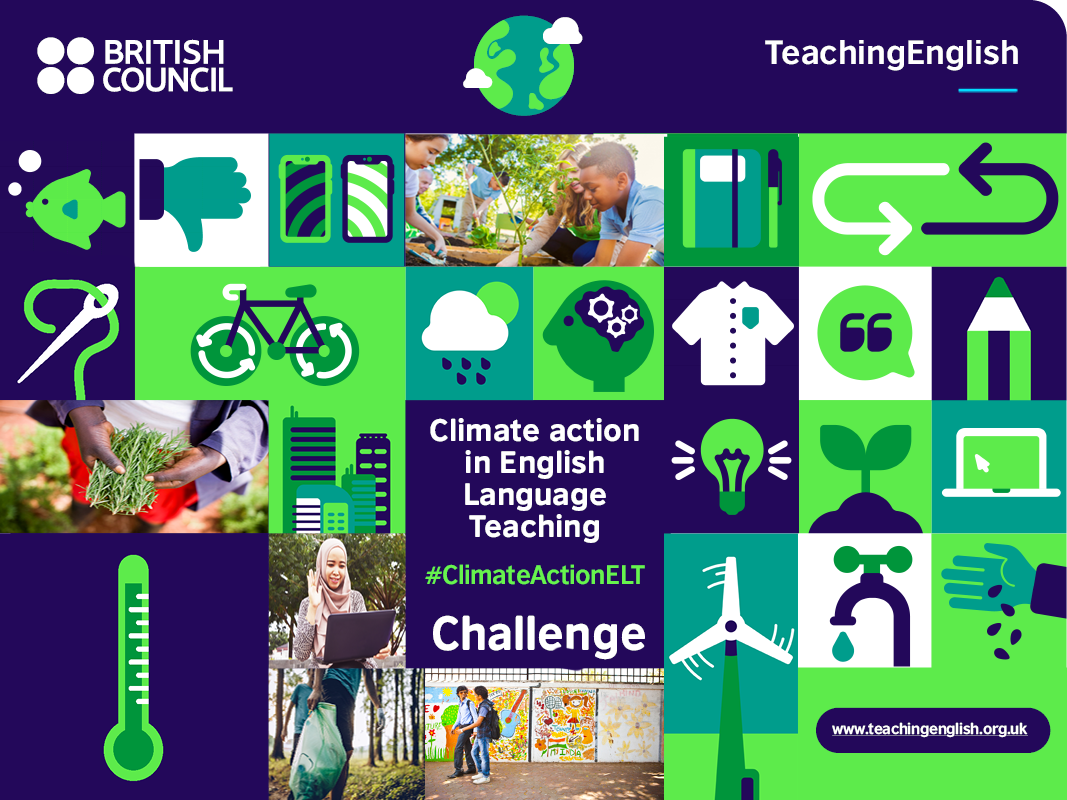
 Online activities
Online activities
Follow #ClimateActionELT to discover online resources connected to climate action in language education.
 Lesson plans
Lesson plans
The lessons cover a range of levels and age groups, and each explores a different topic, from sports to storms and from families to fashion. They are designed with flexibility in mind, can be integrated within existing curricula and are available in two versions, for classroom-based lessons and online teaching. The writers of these lesson plans, Katherine Bilsborough, Christopher Graham and Daniel Barber, are three of the founding members of ELT Footprint, a global community of more than 3,500 teachers, trainers, writers and publishers dedicated to reducing the environmental impact of their place of work, the ELT profession.
See all the lesson plans below.
 Online training courses
Online training courses
Climate action in language education is a free course for teachers which will be available from 9 October 2024 - 31 March 2025. During the course you will learn to integrate environmental issues in English language teaching and develop the skills you need to take and sustain meaningful and impactful action to protect the environment in your local context. Climate action in language education is open for enrolment now.
Find out more about the course here.
 The Climate Connection - Competition winners
The Climate Connection - Competition winners
As well as the lessons created by Katherine, Christopher and Daniel, we have a series of competition-winning lesson plans, which have developed by Digital Learning Associates. Each of these lessons includes video input and comes with a full set of teaching and student resources for a 45-minute ELT lesson themed on taking action on environmental issues, and is in English graded at CEFR level B1.
 Resource book
Resource book
There is also a downloadable resource book, called Climate action in language education: Activities for low resource contexts. This publication provides teachers with a bank of thirty activities, based on ten climate change themes, with step-by-step guidance for each activity.
 Lesson plans
Lesson plans
See a selection of lesson plans below that you can use to focus on climate issues in your classroom.
- Lesson plans for primary learners
A green classroom
Age/level: Suitable for use with primary learners aged 6-8 years at elementary level (CEFR A1) and above
This lesson focuses on green classrooms, encouraging learners to think about ways in which they can make their classroom greener. By teaching primary children more about this topic, we can help them to develop the vocabulary they need to take part in important dialogues around sustainability in the future and help them understand that they can do their bit to make their world greener.Use this lesson in your face-to-face or online teaching
The 5 R's of sustainability
Age/level: Suitable for use with primary learners aged 9-11 years at pre-intermediate level (CEFR A2) and above
Children often learn about ‘the three Rs’ at school: reduce, reuse, recycle. But in recent years, more sustainability-related Rs have appeared. By teaching children more about this topic, we can help them to develop the vocabulary they need to take part in important dialogues around sustainability in the future and help them understand that there are many things we can do to help the planet.
Use this lesson in your face-to-face or online teaching
A new logo for the World Wildlife Fund
Age/level: Suitable for use with primary learners aged 9-11 years at pre-intermediate level (CEFR A2) and above
This lesson is part of a series of engaging lessons about the climate emergency and biodiversity loss. It explores different topics connected to the crisis. In this lesson, learners will reflect on the importance of all animals, and look at how big, cute animals are over-represented in wildlife conservation efforts. They will read about five more unusual, endangered animals and choose one to replace the giant panda as the symbol of worldwide conservation.
- Lesson plans for secondary learners
Sports in (climate) crisis
Age/level: Suitable for use with older teenagers at advanced level (CEFR C1) and above
In this lesson, learners will learn about the impact of major sports events on the living planet and the impact of global heating on sports, and explore possible solutions and compromises that the world of sport might need to take to lessen its impact. It would be a suitable lesson to supplement a unit in the coursebook on sport, or at the time of a major sports event.
Use this lesson in your face-to-face or online teaching
Fast fashion
Age/level: Suitable for use with younger teenagers aged 12–15 at pre-intermediate level (CEFR A2) and above
This lesson focuses on fast fashion, presenting key data in the form of an infographic. By teaching teenagers more about this topic, we can help them to develop the vocabulary they need to take part in important dialogues around sustainability in the future and help them understand that there are alternatives to fast fashion. The lesson begins with a warmer to introduce the topic. This is followed by a matching word–definition task, with keywords that appear in the infographic. Learners then have an opportunity to practise saying big numbers and statistics before they complete the infographic and discuss the information, including thinking of ways they can change their habits in the future. The lesson finishes with a brainstorming activity in which learners find and present ideas for upcycling a T-shirt.
Use this lesson in your face-to-face or online teaching
Upcycling
Age/level: Suitable for use with older teenagers at intermediate level (CEFR B1) and above
This lesson focuses on upcycling, encouraging learners to think about ways in which they can upcycle common objects. By teaching teenagers more about this topic, we can help them to develop the vocabulary they need to take part in important dialogues around sustainability in the future and help them understand that they can do their bit to make their world greener. The lesson begins with a warmer to introduce the topic. This is followed by a crossword with key ‘green’ vocabulary and a text analysis activity to model language they need for the last activity of the lesson. Learners play an upcycling speaking game, where they start thinking creatively about the possibilities that upcycling offers. In the final part of the lesson, learners work in pairs or small groups to plan, prepare, research and present their ideas for an upcycling project.
Use this lesson in your face-to-face or online teaching
Buy. Use. Toss
Age/level: Suitable for use with lower secondary learners at intermediate level (CEFR B1) and above
This lesson is part of the Climate Action in Language Teaching series of engaging lessons about the climate emergency and biodiversity loss. It explores different topics connected to the crisis. Learners will think about what happens to the things we throw away. They categorise some rubbish into ‘necessary’ and ‘luxury’ products then answer questions about the last plastic item they threw away. They read the ‘autobiography’ of a plastic bottle and write their own story in the same style. Finally, they discuss the extent to which other people’s waste is their responsibility and the responsibility of all, and agree on practical ways to reduce plastic waste in the world at three levels: personal, local and national/ corporate.
Use this lesson in your face-to-face or online teaching
Family footprint
Age/level: Suitable for use with older teenagers at upper-intermediate level (CEFR B2) and above
The climate emergency begins at home, and self-awareness of the impact of home life on the environment is very important. In this lesson, learners will develop their language and 21st-century skills in critical thinking and reaching agreement and compromise in discussions. They will then implement a questionnaire with some sensitive questions about home life and environmental issues.
Use this lesson in your face-to-face or online teaching
Storm coming!
Age/level: Suitable for use with younger teenage learners of English at upper-intermediate level (CEFR B2) and above
In this lesson, learners will learn extreme weather vocabulary and read and listen to news reports about weather events. They then collaborate in groups and role play an emergency meeting to save their town. This lesson would be suitable as a supplement to a unit on weather, geography or the environment, after a recent extreme weather event, or near World Meteorological Day on 23 March.
Use this lesson in your face-to-face or online teaching
The Climate Connection - Power to change
In this video and lesson plan from the Climate Connection environment series, four schools around the world report on their concrete impacts in improving their environment or tackling climate change. Students from India, Zimbabwe and Malaysia describe their achievements in carbon reduction, plastic waste removal, and redesigning festivals to reduce pollution.
The Climate Connection - Making our school green
This video and lesson plan from the Climate Connections series looks in detail at projects in three schools, which aim to solve local and global problems through active pupil engagement in environmental challenges. Using student videos mainly from Indonesia and one from Lebanon, the video gives a youth voice on projects in planting and water conservation.
Climate Action - The winners
Schools around the world made videos in 2021 reporting their work in sustainability, and this video rounds up the ten best videos submitted to the British Council. This showcase of young people’s environmental actions shows students from the Philippines to Ethiopia and from Nigeria to Ukraine engaged in a range of projects in their communities, each with a goal such as reducing climate change or increasing biodiversity.
Climate Action - Ukraine School Project
This free education resource has been developed based on a film submitted in 2021 to the British Council’s Climate Connections project. The children based in a school in Vydranytsia (the western part of Ukraine) share how their projects and activities are responding to environmental and climate issues.
- Lesson plans for adult learners
Water for all
Age/level: Suitable for use with adult learners of English at intermediate level (CEFR B1) and above
There is a global water crisis. In this lesson, the learners will use and develop their reading skills to gain a bigger understanding of the crisis, its causes and some possible solutions. They will go on to use some 21st-century skills such as collaboration and creativity to make some campaigning posters to create a greater awareness of the problem in their local communities.
Use this lesson in your face-to-face or online teaching
Farming and the environment
Age/level: Suitable for use with adult learners of English at upper-intermediate level (CEFR B2) and above
This lesson looks at how farming can damage the environment, but also how climate change can make farming difficult. Students will be discussing farming and the environment from different perspectives, and some groups will present their ideas to the whole class.
Use this lesson in your face-to-face or online teaching
21st century jobs
Age/level: Suitable for use with adult learners of English at advanced level (CEFR C1) and above
This lesson will encourage learners to discuss the future of work and the environmental impact that the workplace can and could have. They will consider both the types of jobs that we can expect to develop in the 21st century and the nature and characteristics of the jobs. The final task will be to make a list of ideas for the future of work in the light of the climate crisis and global inequality.
Comments
Thank you for sharing!
Great materials. Really worth using them. I will adapt and use them in my own context.
AMAZING!!! Exactly what I was looking for!! Thanks a lot!